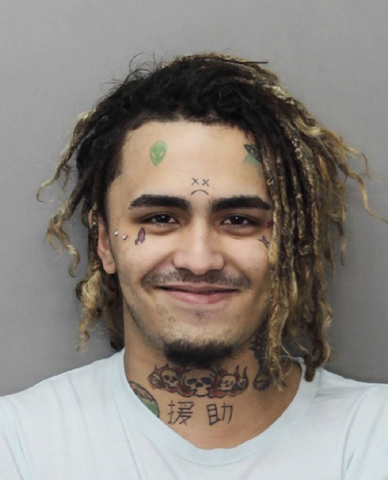Photo by Miami-Dade County Jail | Rapper Lil Pump after being arrested in Miami, Fla.
By Jackson Moran ’21
THE ROUNDUP
Many modern musicians, through actions and lyrics, have failed to be proper role models for young people in today’s culture.
Rappers, in particular those who make up the genre of “Gangsta Rap,” are often toxic influences on children, as their lyrics can be violent, profane and laden with drug language.
Wildly successful rapper Eminem has been at the center of much controversy over his lyrics, which often feature murder and mistreatment of women.
His lyrics sometimes describe the pimp culture associated with rappers, and he harrowingly depicts violence against women in his songs.
However, Eminem has also used his songs to tackle important social issues, with his song “Stan” taking on mental health issues and unhealthy obsessions and his personal success story is the subject of inspirational songs such as “Lose Yourself.”
While he uses prose and rap as an instrument of social change and a way to talk about issues, this should not downplay the words and meanings, be they blatant or ulterior, of some of his songs.
The light and the dark aspects of Eminem’s rap career is evidence of how the rap genre can be a used in a positive or negative way, and also provides the basis at to whether or not rappers should be acting as role models.
These songs, while rarely played on the radio, are released on albums that are purchased by young fans or listened to on services such as Spotify.
Young people’s malleable and impulsive minds can be twisted and distorted into thinking these acts are allowed, or even endorsed by the musician.
Some rappers not only describe violence in their music, but also commit the acts they portray.
Recently, rapper Tekashi 6ix9ine was arrested on six counts of racketeering charges, according to a Newsweek article, in which he has been linked to a bank robbery and murders.
He had been associated with a New York gang, the Nine Trey Bloods, and their name and references to them appear frequently in his lyrics.
While it is just lyrics in a song, music often serves to plant ideas in the minds of the listener and mentions to gangs, glorifying them and providing a platform for their message, are particularly harmful to young fans who allow these ideas to take root.
It is dangerous for people, such as Tekashi 6ix9ine, who have massive influence over their listeners to be openly promoting violence and gang activity, and it should disqualify them as someone to be respected and idolized by today’s youth.
Drug use has been prevalent in musical culture ever since the psychedelic rock revolution of the 1960s.
Nowadays, artists explicitly use the names drugs such as cocaine and marijuana as cheap lyrics thrown in incessantly, often displaying a lack of creativity.
Rappers such as Lil’ Pump and Snoop Dogg have glorified drug usage in their music, conveying this dangerous message to young, at risk people by means of catchy songs.
For example, the song “Mask Off,” by rapper Future, mentions “molly” or ecstasy eleven times, and percocet over twenty times.
While it is a catchy song, its promotion of drug use to numb pain is a powerful suggestion, especially while our country is entrapped in an opioid epidemic.
With drug use being equated with good feelings and monetary success, listeners may take these messages to heart and try substances, even abusing them.
Musicians have also built reputations on drug use, with Snoop Dogg coming to mind almost instantly.
His reputation for smoking marijuana has boosted his popularity with his song “Smoke Weed Everyday.”
While marijuana, has become legal in many states, other more dangerous and illegal drugs are becoming more synonymous with modern rap lifestyles.
Finally, today’s musicians use incessant profane language in songs as a replacement for real, thoughtful lyrics.
Offensive language in rap is nothing new and can be considered an integral part of the genre.
While rappers are justified in using this language to express their thoughts, it is not healthy for young listeners to hear these words and use them in social settings.
Their words seemingly justifies the casual and constant use of explicit language, and while some people see no harm in profanity, many consider it a sign of lack of intelligence or vocabulary.
Lil’ Pump’s song “Gucci Gang” has a total of twenty-nine expletives.
When he is not ceaselessly chanting “gucci gang,” which he says fifty-two times and makes up nearly a quarter of the lyrics, there is, on average, an expletive every eleven words.
This comes to a total, minus the words gucci and gang, of profanities making up nine percent of the song.
Unnecessary use of profanity shows his lack of creative skill and provides listeners with the impression that they too can constantly use offensive language and still be socially successful.
The rap genre, while generally used correctly by poets seeking to set their prose to song, often portrays messages and uses language that is not healthy for young listeners to take to heart.



















